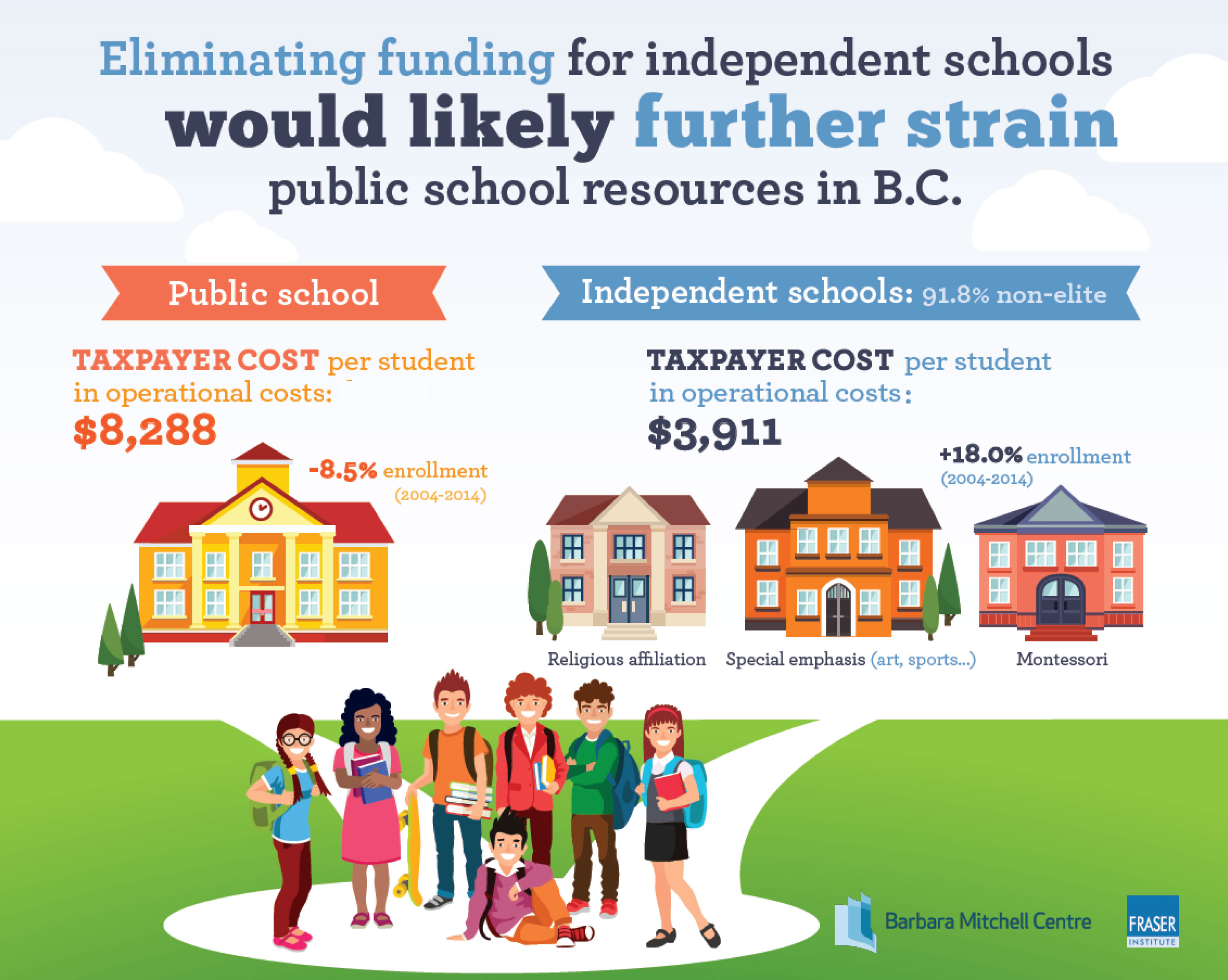Study
| EST. READ TIME 2 MIN.Eliminating funding for independent schools would likely further strain public school resources in B.C.
Calls for reductions to or elimination of funding for independent schools in British Columbia are based on misperceptions, specifically, that parents choose independent schools because public schools are underfunded; that independent schools are "elite" and that government funding of independent schools drain public expenditures.
The evidence demonstrates a contrasting reality. First, spending on public schools increased by 19.8% between 2004/05 to 2013/14, from $5.3 billion to $6.4 billion (an increase of 7.1% when price changes are considered).
Second, when the decline in enrolments in public schools is taken into account, per-pupil spending in public schools increased over the decade (2004/05 to 2013/14) by 18.3% from $9,971 to $11,797 (adjusted for inflation, in 2014$).
Third, over the decade (from 2003/04 to 2012/13) the vast majority of the increase in spending (61.3 %) went to staff compensation.
Fourth, enrolments in independent schools increased nearly 18% over the decade 2004/05 to 2013/14 and waitlist evidence from 2012 shows that increases may well have been higher had spaces been available. During the same period public school enrolments declined by 8.5%.
Fifth, the elitist caricature of independent schools does not hold. Most exist to serve other parental preferences in education. More than 55% are religiously-oriented and 20% have a specialty teaching or learning emphasis.
In 2015/16, the government spent an average of $8,288 per public school student for operational expenditures while it granted an average of $3,911 per independent school student. If funding were eliminated and more than 37,464 students migrated back to public schools, provincial expenditure on education would increase, further straining finances.

Share
-

Deani Van Pelt
Senior Fellow, Fraser Institute
Deani Van Pelt is a Senior Fellow and Former Director of the Barbara Mitchell Centre for Improvement in Education at theFraser Institute. Following her studies at McMaster University (B.Comm.) and the University of Toronto (B.Ed.) she taught mathematics and business subjects in both public and private secondary schools. She then completed her M.Ed. and Ph.D. in Education at The University of Western Ontario where she was awarded the Bishop Townshend Gold Medal Award for excellence in graduate studies. From 2006 to 2014 she served at Redeemer University College, first as Assistant Professor and then as Associate Professor of Education. During this time she led several international research collaborations funded by the Social Sciences and Humanities Research Council of Canada, taught a variety of courses including Systems of Education, and was Director of Teacher Education for four years. Her research and publications in Canadian education policy include studies in home schooling, independent schooling and education funding. She has presented numerous times over the last two decades in academic and practitioner conferences across North America. Recently a co-author of the Fraser Institute studies Education Spending in Canada: What’s Really Happening? and Financial Savings: Restructuring Education in Ontario Using the British Columbia Model, she continues to appear on TV and in radio talk shows across Canada. Her work has been featured in many Canadian newspapers including the National Post and Globe and Mail and she has served as an expert witness.… Read more Read Less… -

Sazid Hasan
Sazid Hasan is a former economist at the Fraser Institute who worked on fiscal, health, and education policy. He received his M.A.in economics from Simon Fraser University. He also holds an M.S.S. and B.S.S. (honours), both in economics, from the University of Dhaka. He worked on his graduate project at the Research Data Centre of Statistics Canada, where he examined the impact of a tax credit on labour supply. He has presented his academic research at the annual conferences of Canadian Economics Association. His commentaries have appeared in the Vancouver Sun, Winnipeg Sun, and La Presse.… Read more Read Less… -

Niels Veldhuis
President, Fraser InstituteNiels Veldhuis serves as President of the Fraser Institute, Canada’s most influential think tank.In his over 20-plus-year career in publicpolicy, Niels has authored six books and more than 50 peer-reviewed studies on a wide range of economic topics. In 2011, he was awarded (along with his co-authors) the prestigious Sir Antony Fisher International Memorial Award for the best-selling book, The Canadian Century.Highly regarded for his opinions and perspectives on major economic and social issues, Niels appears regularly in the media across Canada and the United States. He has written hundreds of commentaries that have appeared in over 50 newspapers, including the Globe and Mail, Wall Street Journal, National Post, and The Economist.Known for his ability to explain matters of economics and government policy in a down-to-earth and easily understood manner, Niels travels widely across North America. His speaking engagements extend to diverse audiences, including business groups, corporate gatherings, community organizations, and students.Niels has had the privilege of sharing the stage and moderating discussions with prominent business and political leaders from around the world. Notable individuals include Prime Minister Stephen Harper, Prime Minister Brian Mulroney, and BC Premier Gordon Campbell. He has also moderated discussions with distinguished Canadian journalists such as Chantal Herbert, Andrew Coyne, and Rex Murphy, as well as diplomats such as Canada’s Ambassador to China and Israel’s Ambassador to Canada. Niels moderated a discussion between United States Presidents Bill Clinton and George W. Bush in 2011 and has facilitated conversations with impactful authors like Mosab Hassan Yousef (author of "Son of Hamas") and Lord Conrad Black.Niels Veldhuis is an alumnus of Simon Fraser University, was one of Vancouver’s Top 40 under 40 by Business in Vancouver in 2010, and is a member of the Young Presidents’ Organization (YPO).… Read more Read Less…
Related Topics
Related Articles
By: Michael Zwaagstra
By: Michael Zwaagstra
By: Michael Zwaagstra
By: Michael Zwaagstra